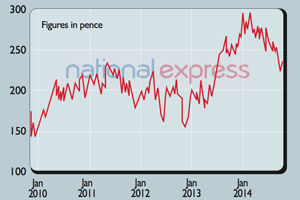
National Express won’t set pulses racing, but it’s a solid business going cheap, says Phil Oakley.
National Express is best known for those familiar coaches that plough up and down Britain’s motorways. However, the company has done a lot more than this for some time now.
From running one of the country’s biggest bus businesses, to rail franchises, school buses in America and branching out into Spain and north Africa, it has its fingers in many pies.
Back in 2009 National Express made a real hash of running the East Coast mainline rail franchise in the UK. It massively overestimated how much money it could make from it and couldn’t pay the government the money it promised. Burdened by lots of debt, National Express had to go cap in hand to its shareholders for more cash to prop it up.
On top of that, National Express has had to put up with a belligerent activist American shareholder who demanded that certain businesses be sold off. In the meantime, the company has been steadily putting its house in order.
Despite making some decent improvements, National Express’s share price has failed to make much headway over the last five years. This raises the following question: are the shares ‘dead money’, or have they been overlooked?
The outlook
It’s probably fair to say that a company such as National Express is unlikely to set investors’ pulses racing. In fact, the daily grind of getting passengers from A to B is decidedly dull. But when it comes to picking dependable investments, being dull can often prove to be a good thing.
If – and sometimes it’s a big if – management teams are sensible and don’t try to be too clever, then running buses and trains can be a very dependable business. So what’s behind National Express’s decidedly lacklustre share price?
There are two main issues: profits have struggled to grow and the company still has a lot of debt. As a result, many investors are not really interested in buying the shares. But could things be about to change?
I think they could. A read through the company’s latest accounts gives grounds for optimism. Let’s start with its biggest source of profits, running buses in Spain through a business called Alsa.
This business has been under pressure from competitors. In particular, the high-speed train operators have been eating into Alsa’s business on inter-city routes by slashing prices. There have also been concerns that Alsa might not retain some of its more lucrative contracts.
Profits have been falling, but Alsa has responded well to the threats it faces and is building momentum again. The retention of one of its biggest contracts last week should also reassure some of the doubters.
On top of that, there seems to be potential to grow profits in places such as Morocco and the Middle East. Things should get better in its American school bus business too. The company has been successful in retaining 98% of its contracts and has been steadily getting rid of loss-making ones.
The extremely cold weather that reduced profits in the first half of 2014 is unlikely to repeat itself every year. A combination of better efficiency and small bolt-ons of new buses should see modest profit growth going forward. A weakening of the pound will also help.
Profit in coaches
What’s more, the company’s UK coach business has a lot going for it. Compared with the ever-increasing cost of travelling by train, National Express coaches are great value for money. And it seems more and more people are realising this, given the growth in sales and profits during the first half of 2014.
Customer service is getting better too, with shorter journey times on many routes. This business looks like a good source of profit growth.
If there’s one thing I’m not too keen on it’s the recently won C2C rail franchise, which runs for 15 years out to 2029. While rail is not a major game changer in terms of making shareholders better off, recent history suggests that it has the potential to cause major problems if things go wrong.
National Express is betting on carrying a lot more passengers from south Essex into London and is aiming at growing sales aggressively – perhaps too much so. A downturn in the economy and London job market could see this business come a cropper.
Should you buy the shares?
This aside, I think the current share price may be assuming too pessimistic an outlook for the company. In fact, I’d go as far as to say that the shares may be attractive even if profits don’t grow at all. That’s because National Express is generating lots of free cash flow.
Even though profits probably won’t grow that much, strong cash flows could see the company drastically reduce its debt by over £200m during the next three years.
Just like paying off a mortgage, paying down debt creates a bigger chunk of equity value – over 40p per share, according to my calculations. Throw in another 30p or so of dividends over the same period and this looks quite attractive.
To explain this further, National Express expects to generate £150m of free cash flow in 2014, or 29.3p per share. This gives the shares a free cash-flow yield of 12.7% at a share price of 231p. That’s none too shabby and comfortably covers the expected dividend of 10.4p per share. National Express may not be exciting, but its shares are arguably too cheap.
Verdict: buy
National Express (LSE: NEX)
Share price: 231p
Market cap: £1.18bn
Net assets (June 2014): £842m
Net debt (June 2014): £729m
P/e (prospective): 10.8 times
Dividend yield (prospective): 4.5%
EBIT/EV (latest): 10.0%
ROCE: 10.7%
Interest cover: 3.6 times
Dividend cover: 2.1 times
Directors’ shareholdings
D Finch (CEO): 294,598
M Ashley (CFO): 0
J Armitt (Chair): 6,000
What the analysts say
Buy: 9
Hold: 9
Sell: 0
Target price: 290p